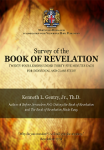 PMW 2021-069 by Kenneth L. Gentry, Jr.
PMW 2021-069 by Kenneth L. Gentry, Jr.
Although the vast majority of Revelation focuses on events that will occur “soon” (Rev 1:1, 3), the Revelation 20 section on the thousand years begins, but is not completed, in the first century. It projects itself into the distant future, allowing a glimpse of the end result of the events beginning in the apostolic era.
In Rev 20:4 John focuses on the martyred saints, who participate in Christ’s heavenly rule (Rev 20:4): “the souls of those who had been beheaded for their witness and those who had not worshiped the beast.” Given John’s time-frame concern (cf. Rev 1:3, 9), his focus is on the martyrs of the first-century era (Rev 6:9–11; 7:9, 13–15; 11:7–12; 12:5; 13:7, 15; 14:13; 16:6; 17:6; 18:20, 24). In fact, 20:4 is the answer to the plea of the martyrs in Rev 6:9–11, as we can see from the strong parallels between the passages:
|
Rev 20:4 And I saw the souls of those who had been beheaded because of the testimony of Jesus and because of the word of God.
|
Rev 6:9 I saw underneath the altar the souls of those who had been slain because of the word of God, and because of the testimony which they had main-tained.
|
In Revelation 20:1–3 John explicates the first phase of Christ’s triumph over Satan: he is spiritually bound, being restricted from successfully accomplishing his evil design in history. In Revelation 20:7–10 we witness the second and concluding phase of Christ’s triumph: Satan is personally punished, being tormented in the eternal flames of the lake of fire. John employs this two-fold pattern of spiritual/physical realities followed by initial/conclusive realities in the resurrection reference in Revelation 20, as well.
Keys to the Book of Revelation
(DVDs by Ken Gentry)
Provides the necessary keys for opening Revelation to a deeper and clearer understanding.
See more study materials at: www.KennethGentry.com
The “first resurrection” secures the participation of the martyred saints in Christ’s rule (Rev 20:4–6). The context suggests that this resurrection may not be literal. After all, we see a chain binding Satan and a key locking the abyss. As in the case of the two-fold triumph over Satan, this is the initial, spiritual victory-resurrection. That is, it refers to the spiritual resurrection of the martyrs who are born again by God’s grace and enter heaven to new life. After all, elsewhere Scripture speaks of salvation as a spiritual resurrection: “We know that we have passed from death to life, because we love the brethren. He who does not love his brother abides in death” (1Jn 3:14; cp. See also: Ro 6:8–11; Eph 2:6; Col 2:13–14). For dramatic purposes John ties this resurrection to the martyr’s vindication in AD 70.
Elsewhere John, Revelation’s author, speaks of a non-literal resurrection that occurs at the moment of salvation, much like Rev 20 associates a non-literal resurrection with the martyrs’ vindication in AD 70. He presents this in such a way that it serves as an advance indication of the final eschatological resurrection:
“Most assuredly, I say to you, he who hears My word and believes in Him who sent Me has everlasting life, and shall not come into judgment, but has passed from death into life. Most assuredly, I say to you, the hour is coming, and now is, when the dead will hear the voice of the Son of God; and those who hear will live. For as the Father has life in Himself, so He has granted the Son to have life in Himself, and has given Him authority to execute judgment also, because He is the Son of Man. Do not marvel at this; for the hour is coming in which all who are in the graves will hear His voice and come forth; those who have done good, to the resurrection of life, and those who have done evil, to the resurrection of condemnation.” (Jn 5:24–29)
John presents the martyrs’ vindication metaphorically as their being resurrected to enthronement, which does not require a physical resurrection. This non-literal enthronement should not surprise us in that earlier he more broadly states that he “has made us kings and priests to His God and Father, to Him be glory and dominion forever and ever” (Rev 1:6). After all, Christians are “overcomers” (cf. 1Jn 2:13–14; 4:4; 5:4–5) and sit with Christ in heavenly rule: “To him who overcomes I will grant to sit with Me on My throne, as I also overcame and sat down with My Father on His throne” (Rev 3:21). As Paul puts it, Christ “raised us up together, and made us sit together in the heavenly places in Christ Jesus” (Eph 2:6).
Book of Revelation Made Easy
(by Ken Gentry)
Helpful introduction to Revelation presenting keys for interpreting. Also provides studies of basic issues in Revelation’s story-line.|
See more study materials at: www.KennethGentry.com
The “rest of the dead” do not participate in this first century, spiritual resurrection. In fact, they “do not live again until the thousand years” is finished (Rev 20:5). For John’s purposes, these dead probably refer to “the rest,” who were killed in Revelation 19:21 — the associates of the beast (Nero) who is slain in the context of AD 70. In the future they will be physically resurrected (implied) in order to experience “the second death” (eternal torment in both body and soul, Mt 10:28), which occurs on Judgment Day (Rev 20:11–15).
Click on the following images for more information on these studies:
 |
 |
 |
Tagged: 1000 years


Hi, dr. Ken
What does “the spiritual resurrection of the martyrs who are born again by God’s grace and enter heaven to new life” mean?
Were they given a special position in heaven until the final resurrection?
Sorry for my english.
God bless
This is a special insight provided to the first century Christians who are facing deadly persecution. It is encouraging them by stating that they do not simply die and vanish from history in vain. Rather God receives them into heaven so that they might participate in Christ’s reign. Thus, their lives are not wasted. In fact, because of their faithfulness, Christianity moves on past the first century catastrophe to continue on for “a thousand years.”
Hi Dr. Gentry,
I agree with you on your view of Revelation 20:4 where there is only one group being described (the martyrs of 6:9-11), however, I’m having trouble reconciling your view of the “rest of the dead” as being those killed in 19:21. I thought that the sword coming out of Jesus’ mouth was symbolic of the Word of God that would “slay” the unregenerate person’s old man and save him instead of physically killing him. If the text said they were killed in any other way, I’d totally agree with your view, but it seems that the sword is purely symbolic to me.
Also, I just want to say thanks for your insight in Revelation. You, along with David Chilton, Gary DeMar, Greg Bahnsen and Doug Wilson have given me a much better understanding of Revelation and I am very much looking forward to your commentary!
Best Regards,
Corey
I hold a different view from Bahnsen (my mentor!) and Chilton on Rev 19. I believe it is another view of the events leading up to and including AD 70 in the cyclical method of John.
Thanks, I agree that Chapter 19 is describing Jerusalem’s destruction and events leading up to it, and that it is not describing the second and final coming of Christ. It just seems to me that when Jesus is smiting the nations and “the rest” with the sword of His mouth it is telescoping into the future symbolizing the success of the Great Commission. Is it possible that the sword is meaning two different things, or am I way off on this view? Thanks again!
That is not my understanding of THIS passage, though the sword of the Spirit can mean such.